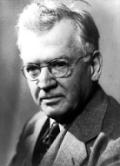A Quote by Fanny Kemble
The whole gamut of good and evil is in every human being, certain notes, from stronger original quality or most frequent use, appearing to form the whole character; but they are only the tones most often heard. The whole scale is in every soul, and the notes most seldom heard will on rare occasions make themselves audible.
Related Quotes
One needs only to study a certain positioning of the hand in relation to the keys to obtain with ease the most beautiful sounds, to know how to play long notes and short notes and to achieve certain unlimited dexterity. A well formed technique, it seems to me, can control and vary a beautiful sound quality.
In most ecological systems you have a composite, biotic components as well as abiotic components acting together to form a whole, whereas in a human built environment most of the components are abiotic or they are inorganic. One of the first things we need to do is to complement the inorganic components with more organic components, and to make them interact to form a whole.
Every question "runs in a vicious circle" because political life as a whole is an endless chain consisting of an infinite number of links. The whole art of politics lies in finding and taking as firm a grip as we can of the link that is least likely to be struck from our hands, the one that is most important at the given moment, the one that most of all guarantees its possessor the possession of the whole chain.
As the mental endowment of a man varies with the organisation of his accumulated experiences, the better endowed he is, the more readily will he be able to remember his whole past, everything that he has ever thought or heard, seen or done, perceived or felt, the more completely in fact will he be able to reproduce his whole life. Universal remembrance of all its experiences, therefore, is the surest, most general, and most easily proved mark of a genius.
Among the innumerable mortifications which waylay human arrogance on every side may well be reckoned our ignorance of the most common objects and effects, a defect of which we become more sensible by every attempt to supply it. Vulgar and inactive minds confound familiarity with knowledge and conceive themselves informed of the whole nature of things when they are shown their form or told their use; but the speculatist, who is not content with superficial views, harasses himself with fruitless curiosity, and still, as he inquires more, perceives only that he knows less.
Behind every word a whole world is hidden that must be imagined. Actually, every word has a great burden of memories, not only just of one person but of all mankind. Take a word such as bread, or war; take a word such as chair, or bed or Heaven. Behind every word is a whole world. I'm afraid that most people use words as something to throw away without sensing the burden that lies in a word.
A good way to work on alternate picking is to choose three or four notes, and work on those. Too often, players who are trying to improve their right hand dexterity get hung up by playing too many notes with the left hand.I hear a lot of players running whole scales from the sixth string to the first , and playing them really sloppy.Keeping it very basic-and using only a few notes-and playing slowly with perfect rhythm is a task in itself.
In most musical instruments the resonator is made of wood while the actual sound generator is of animal origin. In cultures where music is still used as a magical force, the making of an instrument always involves the sacrifice of a living being. That being's soul then becomes part of the instrument and in the tones that come forth, the 'singing dead,' who are ever present with us, make themselves heard.
I've found in composing that being simple and profound—having in-depthness in your music—is the most difficult thing to do. Anybody can write a whole lot of notes, which may or may not say something . . . But why make it complicated for the musicians to play? Why make it difficult for the listeners to hear?
Vocal music is an attempt to take the whole human being and project it into space. It is the ultimate gesture of getting out of yourself. You take a part of you that is most private, most personal, most inward and you hurl it out into space - you project it as far as you can. That gesture of opining this whole region of the body results in an enormous spiritual release, and is felt by other people with tremendous impact.
I have heard Ori Kam on several occasions over the last few years and have always been deeply impressed with his playing. He possesses a rare combination of musical talent, technical facility, intelligence, and charisma, and he is undoubtedly one of the most extraordinary young artists I have heard in recent years.




































